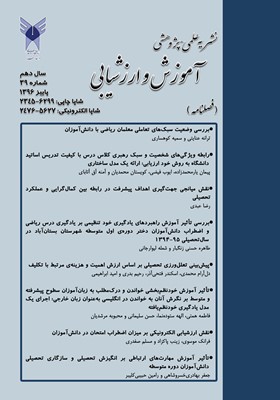نقش میانجی جهتگیری اهداف پیشرفت در رابطه بین کمالگرایی و عملکرد تحصیلی
محورهای موضوعی : روانشناسی تربیتی
1 - استادیار گروه روانشناسی. دانشگاه شهید مدنی آذربایجان.تبریز. ایران
کلید واژه:
چکیده مقاله :
هدف پژوهش حاضر بررسی نقش میانجی جهتگیری اهداف پیشرفت در رابطه بین کمال گرایی و عملکرد تحصیلی در بین دانشجویان بود. بدین منظور 240 دانشجوی دانشگاه شهید مدنی آذربایجان به صورت تصادفی خوشه ای چند مرحله ای انتخاب شده و ابزارهای پژوهش را تکمیل کردند، اما با توجه به ناقص بودن پرسشنامه 6 نفر، تحلیل ها بر روی 234 نفر انجام گرفت. ابزارهای پژوهش شامل مقیاس کمالگرایی هیل، پرسشنامه جهتگیری اهداف (AGQ) بود. یافتهها نشان داد کمال گرایی مثبت تأثیر نیرومند معنیداری بر جهت گیری اهداف تسلط-گرایش، عملکرد-گرایش و عملکرد-اجتناب و کمال گرایی منفی تأثیر مثبت معنیداری بر جهتگیری عملکرد-گرایش و عملکرد-اجتناب دارد؛ همچنین کمال گرایی مثبت تأثیر مثبتی بر عملکرد تحصیلی دارد. علاوه براین جهت گیری هدف تسلط-اجتناب و عملکرد-اجتناب تأثیر معنیدار منفی بر عملکرد تحصیلی دارند. در نهایت یافته ها نشان داد که جهت گیری هدف عملکرد-اجتناب در رابطه بین کمال گرایی مثبت و عملکرد تحصیلی نقش میانجی داشته و موجب کاهش تأثیر مثبت کمال گرایی مثبت بر عملکرد تحصیلی می شود. همچنین جهتگیری عملکرد اجتناب در رابطه کمال گرایی منفی و عملکرد تحصیلی نقش میانجی داشته و موجب شده است که ضریب تأثیر کل منفی باشد.
The aim of the present research was to examine the relationship between perfectionism and academic performance and the mediating role of achievement goal orientation in this regard among students. To this purpose, 240 students from Shahid Madani University were selected by cluster sampling and completed the instruments, among whom six were excluded because of their incomplete questionnaires and the ultimate analysis were done on 234. The instruments were Hill Perfectionism Scale and Achievement Goal Questionnaire. The results showed that the positive perfectionism has a strong effect on Master-Approach, Performance-Approach and Performance-Avoidance orientations and negative perfectionism has an effect on Performance-Approach and Performance-Avoidance orientation. Also, it was found that positive perfectionism has an effect on academic performance. The other findings showed that Master-Avoidance and Performance-Avoidance orientations have a negative effect on academic Performance. Finally, the results showed that Performance-Avoidance orientation has a mediating role in the relationship between positive perfectionism and academic performance and in the relationship between negative perfectionism and academic performance.


